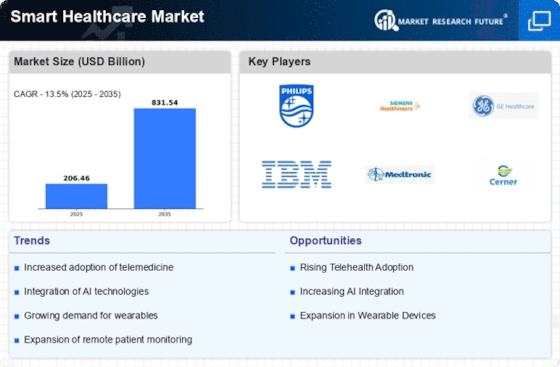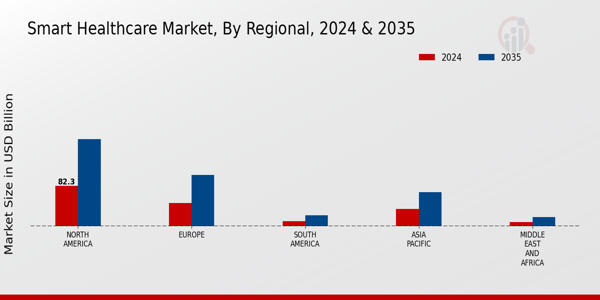Telemedicine
Wearable Devices
Healthcare IT Solutions
Remote Patient Monitoring
Chronic Disease Management
Health Management
Fitness Wellness
Medication Management
Hospitals
Clinics
Home Care
Pharmaceutical Companies
Hardware
Software
Services
North America
Europe
South America
Asia Pacific
Middle East and Africa
North America Outlook (USD Billion, 2019-2035)
North America Smart Healthcare Market by Technology Type
Telemedicine
Wearable Devices
Healthcare IT Solutions
Remote Patient Monitoring
North America Smart Healthcare Market by Application Type
Chronic Disease Management
Health Management
Fitness Wellness
Medication Management
North America Smart Healthcare Market by End Use Type
Hospitals
Clinics
Home Care
Pharmaceutical Companies
North America Smart Healthcare Market by Component Type
Hardware
Software
Services
North America Smart Healthcare Market by Regional Type
US
Canada
US Outlook (USD Billion, 2019-2035)
US Smart Healthcare Market by Technology Type
Telemedicine
Wearable Devices
Healthcare IT Solutions
Remote Patient Monitoring
US Smart Healthcare Market by Application Type
Chronic Disease Management
Health Management
Fitness Wellness
Medication Management
US Smart Healthcare Market by End Use Type
Hospitals
Clinics
Home Care
Pharmaceutical Companies
US Smart Healthcare Market by Component Type
Hardware
Software
Services
CANADA Outlook (USD Billion, 2019-2035)
CANADA Smart Healthcare Market by Technology Type
Telemedicine
Wearable Devices
Healthcare IT Solutions
Remote Patient Monitoring
CANADA Smart Healthcare Market by Application Type
Chronic Disease Management
Health Management
Fitness Wellness
Medication Management
CANADA Smart Healthcare Market by End Use Type
Hospitals
Clinics
Home Care
Pharmaceutical Companies
CANADA Smart Healthcare Market by Component Type
Hardware
Software
Services
Europe Outlook (USD Billion, 2019-2035)
Europe Smart Healthcare Market by Technology Type
Telemedicine
Wearable Devices
Healthcare IT Solutions
Remote Patient Monitoring
Europe Smart Healthcare Market by Application Type
Chronic Disease Management
Health Management
Fitness Wellness
Medication Management
Europe Smart Healthcare Market by End Use Type
Hospitals
Clinics
Home Care
Pharmaceutical Companies
Europe Smart Healthcare Market by Component Type
Hardware
Software
Services
Europe Smart Healthcare Market by Regional Type
Germany
UK
France
Russia
Italy
Spain
Rest of Europe
GERMANY Outlook (USD Billion, 2019-2035)
GERMANY Smart Healthcare Market by Technology Type
Telemedicine
Wearable Devices
Healthcare IT Solutions
Remote Patient Monitoring
GERMANY Smart Healthcare Market by Application Type
Chronic Disease Management
Health Management
Fitness Wellness
Medication Management
GERMANY Smart Healthcare Market by End Use Type
Hospitals
Clinics
Home Care
Pharmaceutical Companies
GERMANY Smart Healthcare Market by Component Type
Hardware
Software
Services
UK Outlook (USD Billion, 2019-2035)
UK Smart Healthcare Market by Technology Type
Telemedicine
Wearable Devices
Healthcare IT Solutions
Remote Patient Monitoring
UK Smart Healthcare Market by Application Type
Chronic Disease Management
Health Management
Fitness Wellness
Medication Management
UK Smart Healthcare Market by End Use Type
Hospitals
Clinics
Home Care
Pharmaceutical Companies
UK Smart Healthcare Market by Component Type
Hardware
Software
Services
FRANCE Outlook (USD Billion, 2019-2035)
FRANCE Smart Healthcare Market by Technology Type
Telemedicine
Wearable Devices
Healthcare IT Solutions
Remote Patient Monitoring
FRANCE Smart Healthcare Market by Application Type
Chronic Disease Management
Health Management
Fitness Wellness
Medication Management
FRANCE Smart Healthcare Market by End Use Type
Hospitals
Clinics
Home Care
Pharmaceutical Companies
FRANCE Smart Healthcare Market by Component Type
Hardware
Software
Services
RUSSIA Outlook (USD Billion, 2019-2035)
RUSSIA Smart Healthcare Market by Technology Type
Telemedicine
Wearable Devices
Healthcare IT Solutions
Remote Patient Monitoring
RUSSIA Smart Healthcare Market by Application Type
Chronic Disease Management
Health Management
Fitness Wellness
Medication Management
RUSSIA Smart Healthcare Market by End Use Type
Hospitals
Clinics
Home Care
Pharmaceutical Companies
RUSSIA Smart Healthcare Market by Component Type
Hardware
Software
Services
ITALY Outlook (USD Billion, 2019-2035)
ITALY Smart Healthcare Market by Technology Type
Telemedicine
Wearable Devices
Healthcare IT Solutions
Remote Patient Monitoring
ITALY Smart Healthcare Market by Application Type
Chronic Disease Management
Health Management
Fitness Wellness
Medication Management
ITALY Smart Healthcare Market by End Use Type
Hospitals
Clinics
Home Care
Pharmaceutical Companies
ITALY Smart Healthcare Market by Component Type
Hardware
Software
Services
SPAIN Outlook (USD Billion, 2019-2035)
SPAIN Smart Healthcare Market by Technology Type
Telemedicine
Wearable Devices
Healthcare IT Solutions
Remote Patient Monitoring
SPAIN Smart Healthcare Market by Application Type
Chronic Disease Management
Health Management
Fitness Wellness
Medication Management
SPAIN Smart Healthcare Market by End Use Type
Hospitals
Clinics
Home Care
Pharmaceutical Companies
SPAIN Smart Healthcare Market by Component Type
Hardware
Software
Services
REST OF EUROPE Outlook (USD Billion, 2019-2035)
REST OF EUROPE Smart Healthcare Market by Technology Type
Telemedicine
Wearable Devices
Healthcare IT Solutions
Remote Patient Monitoring
REST OF EUROPE Smart Healthcare Market by Application Type
Chronic Disease Management
Health Management
Fitness Wellness
Medication Management
REST OF EUROPE Smart Healthcare Market by End Use Type
Hospitals
Clinics
Home Care
Pharmaceutical Companies
REST OF EUROPE Smart Healthcare Market by Component Type
Hardware
Software
Services
APAC Outlook (USD Billion, 2019-2035)
APAC Smart Healthcare Market by Technology Type
Telemedicine
Wearable Devices
Healthcare IT Solutions
Remote Patient Monitoring
APAC Smart Healthcare Market by Application Type
Chronic Disease Management
Health Management
Fitness Wellness
Medication Management
APAC Smart Healthcare Market by End Use Type
Hospitals
Clinics
Home Care
Pharmaceutical Companies
APAC Smart Healthcare Market by Component Type
Hardware
Software
Services
APAC Smart Healthcare Market by Regional Type
China
India
Japan
South Korea
Malaysia
Thailand
Indonesia
Rest of APAC
CHINA Outlook (USD Billion, 2019-2035)
CHINA Smart Healthcare Market by Technology Type
Telemedicine
Wearable Devices
Healthcare IT Solutions
Remote Patient Monitoring
CHINA Smart Healthcare Market by Application Type
Chronic Disease Management
Health Management
Fitness Wellness
Medication Management
CHINA Smart Healthcare Market by End Use Type
Hospitals
Clinics
Home Care
Pharmaceutical Companies
CHINA Smart Healthcare Market by Component Type
Hardware
Software
Services
INDIA Outlook (USD Billion, 2019-2035)
INDIA Smart Healthcare Market by Technology Type
Telemedicine
Wearable Devices
Healthcare IT Solutions
Remote Patient Monitoring
INDIA Smart Healthcare Market by Application Type
Chronic Disease Management
Health Management
Fitness Wellness
Medication Management
INDIA Smart Healthcare Market by End Use Type
Hospitals
Clinics
Home Care
Pharmaceutical Companies
INDIA Smart Healthcare Market by Component Type
Hardware
Software
Services
JAPAN Outlook (USD Billion, 2019-2035)
JAPAN Smart Healthcare Market by Technology Type
Telemedicine
Wearable Devices
Healthcare IT Solutions
Remote Patient Monitoring
JAPAN Smart Healthcare Market by Application Type
Chronic Disease Management
Health Management
Fitness Wellness
Medication Management
JAPAN Smart Healthcare Market by End Use Type
Hospitals
Clinics
Home Care
Pharmaceutical Companies
JAPAN Smart Healthcare Market by Component Type
Hardware
Software
Services
SOUTH KOREA Outlook (USD Billion, 2019-2035)
SOUTH KOREA Smart Healthcare Market by Technology Type
Telemedicine
Wearable Devices
Healthcare IT Solutions
Remote Patient Monitoring
SOUTH KOREA Smart Healthcare Market by Application Type
Chronic Disease Management
Health Management
Fitness Wellness
Medication Management
SOUTH KOREA Smart Healthcare Market by End Use Type
Hospitals
Clinics
Home Care
Pharmaceutical Companies
SOUTH KOREA Smart Healthcare Market by Component Type
Hardware
Software
Services
MALAYSIA Outlook (USD Billion, 2019-2035)
MALAYSIA Smart Healthcare Market by Technology Type
Telemedicine
Wearable Devices
Healthcare IT Solutions
Remote Patient Monitoring
MALAYSIA Smart Healthcare Market by Application Type
Chronic Disease Management
Health Management
Fitness Wellness
Medication Management
MALAYSIA Smart Healthcare Market by End Use Type
Hospitals
Clinics
Home Care
Pharmaceutical Companies
MALAYSIA Smart Healthcare Market by Component Type
Hardware
Software
Services
THAILAND Outlook (USD Billion, 2019-2035)
THAILAND Smart Healthcare Market by Technology Type
Telemedicine
Wearable Devices
Healthcare IT Solutions
Remote Patient Monitoring
THAILAND Smart Healthcare Market by Application Type
Chronic Disease Management
Health Management
Fitness Wellness
Medication Management
THAILAND Smart Healthcare Market by End Use Type
Hospitals
Clinics
Home Care
Pharmaceutical Companies
THAILAND Smart Healthcare Market by Component Type
Hardware
Software
Services
INDONESIA Outlook (USD Billion, 2019-2035)
INDONESIA Smart Healthcare Market by Technology Type
Telemedicine
Wearable Devices
Healthcare IT Solutions
Remote Patient Monitoring
INDONESIA Smart Healthcare Market by Application Type
Chronic Disease Management
Health Management
Fitness Wellness
Medication Management
INDONESIA Smart Healthcare Market by End Use Type
Hospitals
Clinics
Home Care
Pharmaceutical Companies
INDONESIA Smart Healthcare Market by Component Type
Hardware
Software
Services
REST OF APAC Outlook (USD Billion, 2019-2035)
REST OF APAC Smart Healthcare Market by Technology Type
Telemedicine
Wearable Devices
Healthcare IT Solutions
Remote Patient Monitoring
REST OF APAC Smart Healthcare Market by Application Type
Chronic Disease Management
Health Management
Fitness Wellness
Medication Management
REST OF APAC Smart Healthcare Market by End Use Type
Hospitals
Clinics
Home Care
Pharmaceutical Companies
REST OF APAC Smart Healthcare Market by Component Type
Hardware
Software
Services
South America Outlook (USD Billion, 2019-2035)
South America Smart Healthcare Market by Technology Type
Telemedicine
Wearable Devices
Healthcare IT Solutions
Remote Patient Monitoring
South America Smart Healthcare Market by Application Type
Chronic Disease Management
Health Management
Fitness Wellness
Medication Management
South America Smart Healthcare Market by End Use Type
Hospitals
Clinics
Home Care
Pharmaceutical Companies
South America Smart Healthcare Market by Component Type
Hardware
Software
Services
South America Smart Healthcare Market by Regional Type
Brazil
Mexico
Argentina
Rest of South America
BRAZIL Outlook (USD Billion, 2019-2035)
BRAZIL Smart Healthcare Market by Technology Type
Telemedicine
Wearable Devices
Healthcare IT Solutions
Remote Patient Monitoring
BRAZIL Smart Healthcare Market by Application Type
Chronic Disease Management
Health Management
Fitness Wellness
Medication Management
BRAZIL Smart Healthcare Market by End Use Type
Hospitals
Clinics
Home Care
Pharmaceutical Companies
BRAZIL Smart Healthcare Market by Component Type
Hardware
Software
Services
MEXICO Outlook (USD Billion, 2019-2035)
MEXICO Smart Healthcare Market by Technology Type
Telemedicine
Wearable Devices
Healthcare IT Solutions
Remote Patient Monitoring
MEXICO Smart Healthcare Market by Application Type
Chronic Disease Management
Health Management
Fitness Wellness
Medication Management
MEXICO Smart Healthcare Market by End Use Type
Hospitals
Clinics
Home Care
Pharmaceutical Companies
MEXICO Smart Healthcare Market by Component Type
Hardware
Software
Services
ARGENTINA Outlook (USD Billion, 2019-2035)
ARGENTINA Smart Healthcare Market by Technology Type
Telemedicine
Wearable Devices
Healthcare IT Solutions
Remote Patient Monitoring
ARGENTINA Smart Healthcare Market by Application Type
Chronic Disease Management
Health Management
Fitness Wellness
Medication Management
ARGENTINA Smart Healthcare Market by End Use Type
Hospitals
Clinics
Home Care
Pharmaceutical Companies
ARGENTINA Smart Healthcare Market by Component Type
Hardware
Software
Services
REST OF SOUTH AMERICA Outlook (USD Billion, 2019-2035)
REST OF SOUTH AMERICA Smart Healthcare Market by Technology Type
Telemedicine
Wearable Devices
Healthcare IT Solutions
Remote Patient Monitoring
REST OF SOUTH AMERICA Smart Healthcare Market by Application Type
Chronic Disease Management
Health Management
Fitness Wellness
Medication Management
REST OF SOUTH AMERICA Smart Healthcare Market by End Use Type
Hospitals
Clinics
Home Care
Pharmaceutical Companies
REST OF SOUTH AMERICA Smart Healthcare Market by Component Type
Hardware
Software
Services
MEA Outlook (USD Billion, 2019-2035)
MEA Smart Healthcare Market by Technology Type
Telemedicine
Wearable Devices
Healthcare IT Solutions
Remote Patient Monitoring
MEA Smart Healthcare Market by Application Type
Chronic Disease Management
Health Management
Fitness Wellness
Medication Management
MEA Smart Healthcare Market by End Use Type
Hospitals
Clinics
Home Care
Pharmaceutical Companies
MEA Smart Healthcare Market by Component Type
Hardware
Software
Services
MEA Smart Healthcare Market by Regional Type
GCC Countries
South Africa
Rest of MEA
GCC COUNTRIES Outlook (USD Billion, 2019-2035)
GCC COUNTRIES Smart Healthcare Market by Technology Type
Telemedicine
Wearable Devices
Healthcare IT Solutions
Remote Patient Monitoring
GCC COUNTRIES Smart Healthcare Market by Application Type
Chronic Disease Management
Health Management
Fitness Wellness
Medication Management
GCC COUNTRIES Smart Healthcare Market by End Use Type
Hospitals
Clinics
Home Care
Pharmaceutical Companies
GCC COUNTRIES Smart Healthcare Market by Component Type
Hardware
Software
Services
SOUTH AFRICA Outlook (USD Billion, 2019-2035)
SOUTH AFRICA Smart Healthcare Market by Technology Type
Telemedicine
Wearable Devices
Healthcare IT Solutions
Remote Patient Monitoring
SOUTH AFRICA Smart Healthcare Market by Application Type
Chronic Disease Management
Health Management
Fitness Wellness
Medication Management
SOUTH AFRICA Smart Healthcare Market by End Use Type
Hospitals
Clinics
Home Care
Pharmaceutical Companies
SOUTH AFRICA Smart Healthcare Market by Component Type
Hardware
Software
Services
REST OF MEA Outlook (USD Billion, 2019-2035)
REST OF MEA Smart Healthcare Market by Technology Type
Telemedicine
Wearable Devices
Healthcare IT Solutions
Remote Patient Monitoring
REST OF MEA Smart Healthcare Market by Application Type
Chronic Disease Management
Health Management
Fitness Wellness
Medication Management
REST OF MEA Smart Healthcare Market by End Use Type
Hospitals
Clinics
Home Care
Pharmaceutical Companies
REST OF MEA Smart Healthcare Market by Component Type
Hardware
Software
Services










Leave a Comment